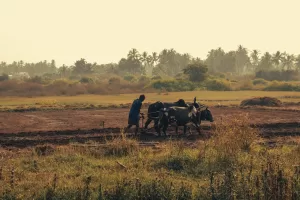Rural households play a pivotal role in contributing to Africa’s food security. Rural agriculture is the sleeping giant of Africa that is yet to be awoken.
Rural Agriculture The Sleeping Giant of Africa

The population of sub-Saharan Africa remains significantly rural. The bulk of sub-Saharan Africa’s population survives through agriculture. More than 60% of sub-Saharan Africa’s population is smallholder farmers. Rural households play a pivotal role in contributing to Africa’s food security. Rural agriculture is the sleeping giant of Africa that is yet to be awoken.
According to the African Development Bank, Africa’s agribusiness sector will likely reach US$1 trillion by 2030. The rural population has a significant part to play if this projection is to come into reality.
Africa has a significant amount of arable land for farming. However, the youth of Africa still faces challenges in owning and gaining access to this land so that they can participate in the agricultural value chain and help fight food insecurity on the continent. Rural land may help address the landlessness and inequality of land ownership faced by the African youth.
Traditionally, land in the rural parts of Africa has been acquired by inheritance or by gaining access to land as an heir. Therein lies the opportunity for young Africans to capitalize on the rural land allocated to their maternal and paternal grandparents as a means to commence their journey into a rewarding and fulfilling life in agriculture.
Not all people have the opportunity to access rural land obtained through inheritance. Therefore, leasing or gaining access to rural land by paying rent to the owner becomes an alternative. In many African countries, because of a historical framework dating back to the pre-colonial period, chiefs are recognized as custodians of the land and have the right to sell land and issue land documents.
Today we are witnessing owners of rural land that acquired it through inheritance, selling sections of their inherited land to buyers looking for land to start agricultural ventures. A record of the transfer of land then gets recorded by the chief.
To all young and aspiring farmers in Africa, accessing land in areas traditionally designated for farming may be a challenge. However, you can start your journey as a farmer in a rural village and grow from there.

Agriculture projects have been implemented successfully in rural areas.
In countries like Zimbabwe, organizations like the Agricultural and Rural Development Authority (ARDA). Are spearheading rural development and industrialization through technology, smart-agricultural practices, and mechanization across Zimbabwe.
The adoption of smart agriculture in rural communities throughout Africa will catapult smallholder farmers to a position of feeding their nations and helping to eradicate food insecurity in their communities in the long term. Farming in rural areas will also help create employment opportunities for rural communities and make a lasting and meaningful impact on those communities.
Rural agriculture will transform the livelihood of people on the continent because a large portion of the continent’s population still resides in rural areas. Investing in rural communities and also in rural agriculture is considered by many governments across the African continent as a long-term solution to solving the challenges of poverty, hunger, and youth unemployment.




